Frank Sinatra
The Cool
Chairman of the Board

(Click on the image to zoom in.)
It's hard to believe that there was a time when a man who sported fedoras, plain business suits, and skinny ties was the Epitome of Cool. But in his heyday Frank Sinatra was cool.
Or rather, in his heydays. Frank was one of the few celebrities who could reinvent himself just when reinvention was needed.
Francis Albert Sinatra first came on the scene in the 1930's as the skinny Frankie!!!!!, the Swoonmeister of the Bobbysoxers. Frank was always a good singer and came to national attention when he was part of a quartet that appeared on the Major Bowes Amateur Hour. He began getting newspaper notice around 1937 when "Frank Sinatra and His Four Sharps" appeared on the Fred Allen Show.
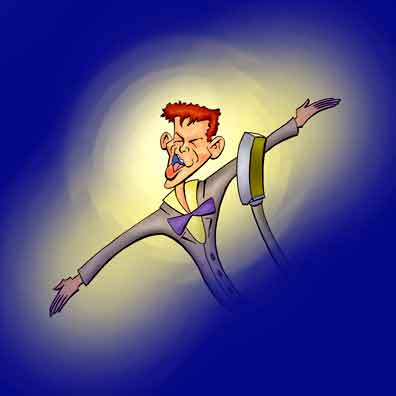
Frankie!!!!
(At $75 a Week)
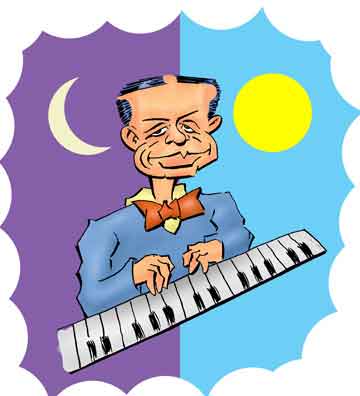
Cole Porter
Frank forgot the lines.
The next year Frank landed a job singing and emceeing at the Rustic Cabin, a "roadhouse" in Englewood Cliffs, New Jersey near the George Washington Bridge. One night one of the band members told him that the famous song writer Cole Porter was in the audience. On the stage, Frank announced he'd sing Cole's song Night and Day and dedicated the performance to Cole - and promptly forgot the words.
Frank didn't hang around the Rustic Cabin too long, and by 1939 he was being mentioned as the singer who provided expressive "warblings" for trumpet player Harry James. Harry paid Frank a whopping $75 a week, but the audience response - especially from the ladies - was so enthusiastic that Frank thought he could do better playing for Tommy Dorsey. So he asked to be let out of his contract, and Harry graciously agreed. In a couple of months Frank was singing for Tommy at a munificent $100 a week.
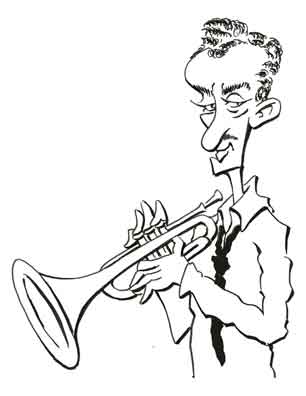
Harry James
Frank warbled for him.
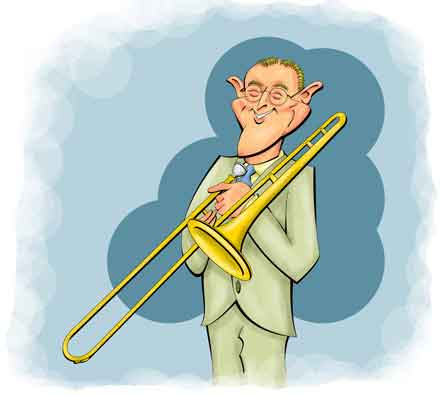
Tommy Dorsey
The biggest of the big time.
Tommy was the Biggest of the Big Time, but Frank's popularity continued to skyrocket to the point where he decided that working for Tommy Dorsey was now a hindrance rather than an asset. How Frank managed the release from his ironclad contract has been the subject of much scholarly debate. There's some accounts that a few of Frank's - ah - "friends" - made Tommy one of those famous offers that are so hard to refuse the same way the fictional Johnny Fontane got out of his contract as depicted in the movie The Godfather. There's another story that the New Jersey mob boss Willie Moretti paid Tommy a visit and smilingly said how pleased he was that Tommy was releasing Frank. No offer was needed.
Frank said that no such things ever happened. He had simply given Tommy a year's notice and managed to get a severance deal worked out although with some rancor on Tommy's part. How much Frank had to pay to get out of the contract is once more an answer lost to history and estimates range from $1 to $60,000.
So it was on December 30, 1942, that Frank sang his first solo concert. He was a smash and through the 1940's, King Frankie ruled.
But as early as 1945, there were signs that the days of the Big Bands were numbered. Instead of 30 member orchestras playing swing music in ballrooms with polished marble dance floors, you would find three-man combos blaring out bebop in small clubs with "No Dancing" signs prominently posted. That probably wasn't much of an issue so no one could dance to bebop anyway.
Soon came the unthinkable. Kids stopped listening to jazz. Instead, they were going to the record stores and buying Rhythm and Blues. Say what you like about the voice of The Voice, Frank was not R&B, nor was he R&B's later incarnation, Rock and Roll.
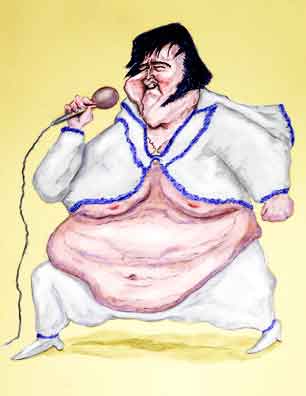
Elvis
The New King
Frank expressed much choler about the new musical genre. In an interview in 1957 he said:
“My only deep sorrow is the unrelenting insistence of recording and motion picture companies upon purveying the most brutal, ugly, degenerate, vicious form of expression it has been my displeasure to hear - naturally I refer to the bulk of rock and roll.
It fosters almost totally negative and destructive reactions in young people. It smells phony and false. It is sung, played, and written for the most part by cretinous goons and by means of its almost imbecilic reiterations and sly, lewd - in plain fact, dirty - lyrics, and as I said before, it manages to be the martial music of every sideburned delinquent on the face of the earth.
Naturally the teenagers disagreed and this brings up the the question of years. After World War II, Frank was in his 30's and as hard as it is to believe with today's abundance of octogenarian rock stars, anyone over 30 was too old for a teenager to idolize. Then in 1954 came the 19-year old Elvis, as the New King of the In-Crowd. Frank was dethroned.
Fortunately there was an alternate venue for boosting celebrity. Motion pictures had been around for nigh on half a century. Some singers - Bing Crosby, Lena Horne, Gene Autry - had appeared in movies and Frank had quickly followed suit. Starting in 1941 he had been featured in Ship Ahoy, Las Vegas Nights, and Reveille with Beverly. However, these appearances were simply Frank playing himself for a song or two.
New movie stars like ...

Lena ...

... and Gene..
Real acting roles began to come his way in 1943 with Higher and Higher, which was followed by Step Lively, Anchors Aweigh, Take Me Out to the Ball Game, It Happened in Brooklyn, On the Town, Double Dynamite, Johnny Dalton, and Meet Danny Wilson. These, though, were musicals and although he played different characters he was still in the films because he was Frank Sinatra.
All in all, reviews of Frank's films were not bad, but we must admit they weren't always stellar, and later critics tended to be rather tough. In 1948 Frank had the starring role in - get this - The Kissing Bandit where he played, yes the Kissing Bandit. Although not a musical in the strict sense, he did sing some songs and the film was a massive box office flop.
Frank really wanted to act and he tried a dramatic role in The Miracle of the Bells also in 1948. But even here - where Frank played a priest - he had to sing a song because if Frank was in a movie then, dang it, people expected him to sing. Again this film was panned in general with Frank's performance receiving particular ridicule. As one critic wrote:
"The Miracle of the Bells" sets itself up as a leading contender for the booby prize for casting the next time the Oscars are distributed. No matter how strong was Frank Sinatra's urge to emulate his old idol, Bing Crosby, by playing Father Paul in "The Miracle of the Bells1", somebody in authority should have registered a firm, unyielding negative. Frankie2 can sing all he wants to and I will even listen to him sometimes, but his talent as an actor - leave us [sic] face it - rests some where at the idle-banter level employed by masters of ceremonies.
He is off key in that priestly guise, trapped with no glissando to slide him back on. It would be a miracle, of course, if a thing like that did not throw an entire picture off balance, but it is not entirely Mr. Sinatra's fault that this film never straightens itself out.
At this point it seems that neither Frank's singing nor his acting bode well for the future. Big Bands were getting too expensive and Frank's songs were not what the remnants of the bobby soxers were listening to. And having two movies flop in one year was not much of a recommendation to Hollywood producers looking for a star for future productions. It wasn't long before Hollywood producers decided they didn't want to work with Frank anymore.
People weren't turning out so see him sing either. He was booked at one major night club only to have about 90% of the seats empty during his run. After nearly a decade, Capitol Records decided to drop Frank as one of their artists. Mitch Miller, later the famous sing-along man but now an executive at Columbia records, said they couldn't even give Frank's records away.
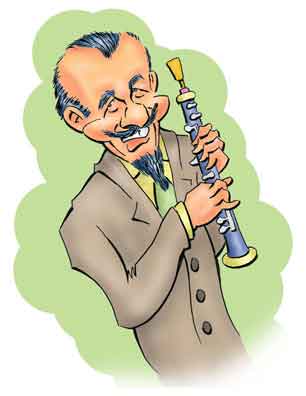
Mitch Miller
They couldn't give Frank's records away.
Audiences booed and heckled him when he performed even in cheap joints. They threw fruit at him on stage. On the streets people scarcely noticed him.
Frank it seems was a has-been. A crooner for bobbysoxers in a day when pop singers didn't croon and bobbysoxers were becoming grown-ups.
Frank who?
But suddenly came the Reinvented Frank. In 1953 he landed the role of Private Angelo Maggio in From Here to Eternity. This was yet another non-singing part and in a serious drama about military life in Hawaii just before Pearl Harbor. The role landed Frank the Academy Award for Best Supporting Actor of 1954.
Winning the Oscar was all the more impressive since Frank was appearing alongside and in some ways competing with some of the top actors of the day. Burt Lancaster, Montgomery Clift, Deborah Kerr, and Donna Reed were the leads, and other roles were ably filled by Ernest Borgnine, Jack Warden, Claude Akins, and George Reeves. Country singer Merle Travis also had a part.

Merle Travis
He had a part.
And yes, there are murmurings that questioned just how the heck did has-been Frank land such a meaty part in what the producers clearly planned to be a blockbuster. Naturally once more there's talk that some of "the boys" strong armed the studio head as depicted for Franky Fontane. Whether anything like this happened is debated, and it may be that Frank just did well for the screen test.
In any case, Frank was a star again. Grown-up audiences again turned out to hear him sing. He started playing at Las Vegas. It was great. You could hear Frank and lose your money at the tables all in one night.
Frank even started appearing on television, for Pete's sake! Not only was he a guest on shows like The Ed Sullivan Show, What's My Line?, The Dean Martin Show, The Tonight Show with Johnny Carson, and Rowan and Martin's Laugh-in, but for two seasons he even had his own television show where one of his guests was - it's hard to believe - Elvis Presley.
Hollywood was back knocking at his door. Some roles were serious like The Man with the Golden Arm, The Devil at Four O'Clock, None But the Brave, and The Manchurian Candidate. Others were comedies: Come Blow Your Horn, 4 for Texas, and (of course) Ocean's 11 featuring the famous Rat Pack, Frank along with Dean Martin, Sammy Davis Jr., Peter Lawford, and Joey Bishop.
The Rat Pack with ...
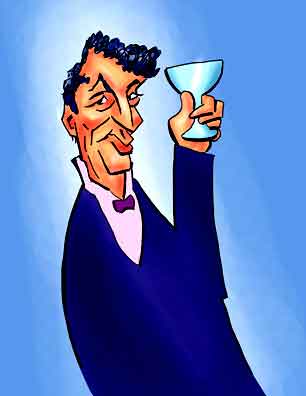
Dean Martin ...
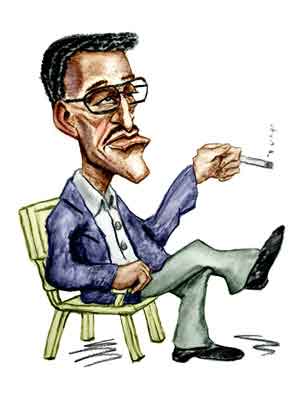
... Sammy Davis, Jr. ...
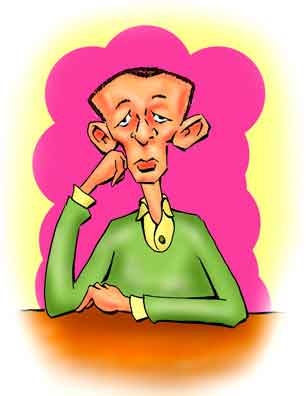
... and Joey Bishop.
Of course, Frank, being Frank, still made musicals, but now he was not just an award winning actor but a cool award winning actor. So Guys and Dolls, Meet Me in Las Vegas, High Society (with Bing Crosby), Pal Joey, Robin and the 7 Hoods, and Can-Can were seen as having a touch of class. Sometimes drama was combined with the music as in The Joker Is Wild where Frank played Joe E. Lewis, the real life singer and comedian who ran afoul of the Chicago mob. Joe, by the way, himself appeared in one of Frank's later (non-musical) films, Lady in Cement.
Lady in Cement was a follow-up of Tony Rome, and in both films Frank stars as Miami private detective Tony Rome. The movies are good fun and not to be taken too seriously. Of course as was typical for Hollywood's image of the tough hard bitten private investigator, Tony gets involved in cases that are really the prerogatives of the police and indulging in behavior that would get a real PI's license lifted faster than you could say "gumshoe".
One of Franks's later and more popular films was Von Ryan's Express released in 1965. A war-adventure POW film produced on the heels of The Great Escape, Frank plays the lead of the no-nonsense Colonel Joseph Ryan. The plot of the movie follows the book by David Westheimer reasonably well although one of the good guys is a bad guy, a bad guy is a good guy, a captain is a sergeant, a potential love interest is added, and an American from South Carolina with a "corn pone accent" becomes an Oxfordly accented Englishman. Also the famous ending - where Ryan is running to catch up with the train before German soldiers shoot him down - was not in the book. Instead in the novel the train makes it safely past the Swiss border with all on board unharmed, including Ryan.
Oh, yes. In the film the name is Colonel Joseph L. Ryan. In the book it's Joseph  G. Ryan.
G. Ryan.
Let's get it right!
The novel had a sequel, Von Ryan's Return, published in 1980. The book picks up with Ryan now comfortably interred with his men in neutral Switzerland but "chafing" with inaction. Of course, the movie's ending made a cinematic sequel virtually impossible, although a creative writer no doubt could have pulled a deus ex machina out of the scriptwriter's hat. But in any case Von Ryan's Return, perhaps mercifully, was never filmed.